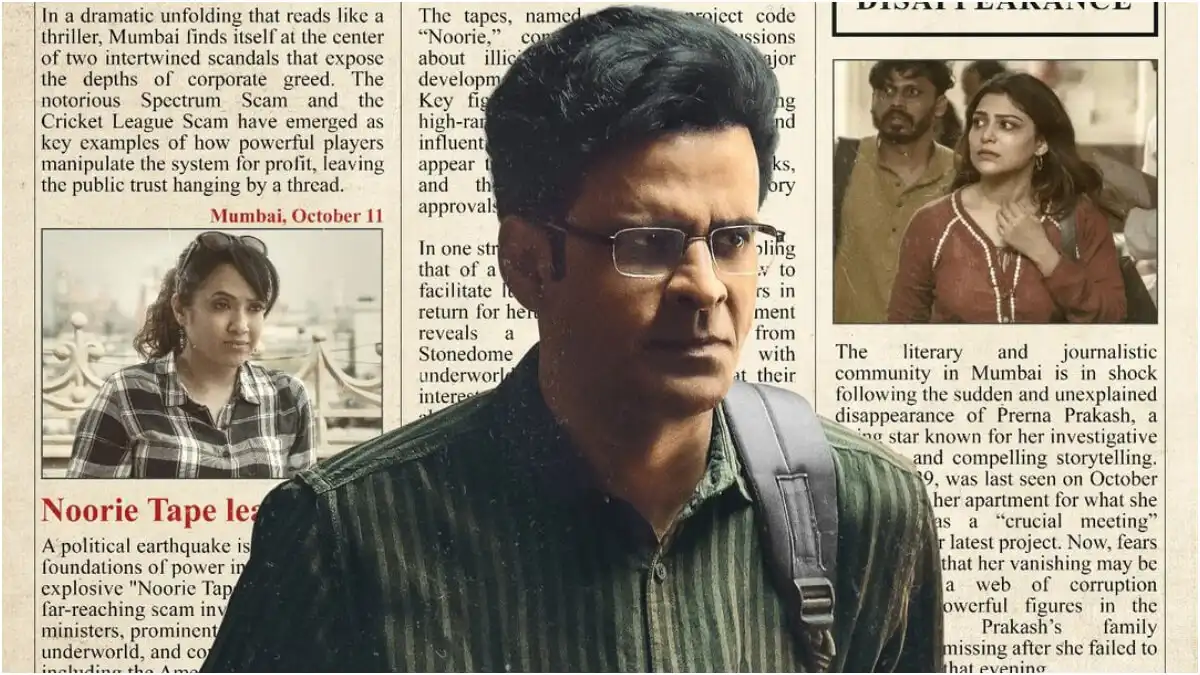In Despatch, director Kanu Behl and writer Ishani Banerjee collaborate to thrust us into the tumultuous world of Joy Bag, a character brought to life with simmering intensity by Manoj Bajpayee.
In today’s world of non-stop breaking news and the extreme lengths media personnel go to to attract eyeballs, where does one draw the line? Who are these people who inhabit this grey area between right and wrong, and more importantly, what kind of lives do they lead?
Despatch, starring Manoj Bajpayee and directed by Kanu Behl, who gave us the critically acclaimed Titli and Agra, attempt to answer this question.
Does it succeed?
Let’s find out.
What’s the Story?
Set against the backdrop of a Mumbai newsroom in 2012, Joy is a veteran crime reporter for a struggling newspaper, grappling with a turbulent personal life being in a passionless marriage to Shweta (played by Shahana Goswami) and an affair with a younger colleague, Prerna (Arrchita Agarwaal).
As the narrative unfolds, what begins as a deeply personal crisis for Joy Bag soon spirals into a professional plight due to the real-life tragedy of journalist J. Dey’s murder. Joy’s journey from an uninterested reporter to a driven investigator mirrors the existential challenges the print media faced during the digital revolution.
What Works?
What sets Despatch apart is its refusal to idolize its protagonist. Joy Bag is portrayed with all his flaws on full display: his predatory tendencies, the exploitation within professional relationships, and his manipulation of those around him, especially the women in his life. This portrayal strips away the romanticized veneer often associated with journalists in cinema, instead presenting a man whose professional motivations are inextricably linked to his personal failings.
The film doesn’t shy away from the ugliness of its settings and characters. Scenes that could have been shot with a heroic flair are instead handled with a deliberate clumsiness. For example, an undercover mission in a Delhi factory and a dockyard shootout in Mumbai are depicted not as sleek, choreographed sequences but as messy, desperate scrambles that underline Joy’s disarray rather than his daring.
Manoj Bajpayee’s performance is the cornerstone of Despatch. He inhabits the skin of Joy Bag with an unsettling authenticity. Every grimace, every forced smile, and the rare moments of vulnerability convey volumes about his character’s internal conflicts. Bajpayee masterfully navigates the complex emotional and ethical landscapes of Joy, turning what could have been a clichéd role into a deeply human portrayal.
Also Read: Vicky Vidya Ka Woh Wala Video Review
What Doesn’t Work

The narrative, dense with subplots involving corruption, money laundering, and the murky underworld, occasionally becomes convoluted. The film fails to fully engage audiences due to a muddled script and a lack of coherent storytelling. Its pacing issues and an overly complex narrative structure that struggled to maintain momentum overshadow its attempt to deliver a gritty, realistic portrayal of the newsroom drama.
Despatch also stumbles in its screenplay execution. The story is peppered with unresolved plot points, and it lacks the structured tightness that anchors a truly engaging drama. The narrative feels scattered, often leaving viewers puzzled over why characters act the way they do and what’s really at stake in Joy’s tumultuous journey.
The Final Verdict
To give the movie credit, Despatch does challenge us to reconsider the archetypal image of the journalistic hero. It dares to suggest that the quest for truth in journalism can sometimes be a personal crusade for validation rather than a noble pursuit of justice. This film is a gritty, raw, and unflinchingly honest examination of the lives of those who deliver our news — a reflection on the personal cost of public truth. However, it often loses its narrative focus, muddling its powerful message with a disjointed storyline that can leave viewers more frustrated than enlightened.
We give it 3 out of 5.




